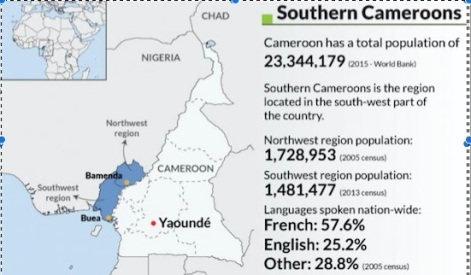This is not meant to be all there is to be known or understood about what’s going on in Cameroon these days around the conflict related to the ongoing strikes. It will be a brief history and explanation of what’s happening now, to better inform those of you who don’t find Cameroon updates in your news feed and also to let you know how these events affect us and our work.
Southern Cameroons was the southern part of the British Mandate territory of Cameroons during colonization.
In 1961, people of Southern Cameroons voted whether to join Nigeria or the Republic of Cameroon, which had already obtained independence from Britain and France one year earlier. The vote resulted in the Southern Cameroons becoming part of the French-speaking Republic of Cameroon.
In 1972, a new constitution was adopted in Cameroon, replacing the federal state with a unitary state.
The Cameroon Anglophone Movement was created in 1984. People originally sought a return to a federal system, but eventually started calling for independence.
The country of Cameroon is officially bi-lingual. The Cameroon Constitution states that both English and French are its state languages, though many official documents are written only in French. The issues go far beyond just the language differences, however.
Since late October 2016, both lawyers and teachers began demonstrating for better working conditions and also against the political and economic marginalization of the two minority Anglophone regions of the country. At times the demonstrations have become violent battles between protesters and security forces. Schools in these two regions were closed and continue to be closed today. Business was halted for some time but has resumed for now.
Teachers and lawyers have long been discontent with the use of French in courts and schools within the English-speaking regions. There have been frustrations with the government for employing court workers who only speak French and don’t understand the application of British Common Law. Teachers have protested against the hiring of educators who only speak French in technical schools within the Anglophone regions.
From the more radical of the protesters, there are demands for complete independence for the Anglophone regions, separating from the rest of the country. Other more moderate protesters want to see a return to federalism.
The government has responded by clamping down on protests and arresting many. On Thursday, December 8, 2016, Cameroonian forces shot dead four demonstrators and wounded 20 others in Bamenda, the largest city in the North West, about an hour south of Mbingo. Currently at least 40 people are still being held in Yaounde after having been transported from Bamenda.
Though there has been some dialogue between the two sides, there does not seem to have been any real progress in communication thus far. The grievances of the demonstrators are not new and it does not appear that they will easily give up or be appeased. It is also not likely that the government will grant concessions.
We received 7 gunshot wound victims at Mbingo, most of them several days or even weeks after their injuries. One died shortly after arrival from an abdominal wound. The others, all young men, had very serious injuries that will lead to long-term disabilities from vascular, neural, and orthopedic injuries. We do not really know the actual number of killed and wounded victims, or whether they were involved in the protests. Some were apparently innocent bystanders and at least one, a young boy, was shot in his home by a stray bullet.
We saw a drop in our overall patient load in December partly, we think, because of difficulty that some patients had getting to us. Most of our patients come to Mbingo from a distance and most have to travel through Bamenda to get to us. We know that the increased security risks in Bamenda deterred some patients from getting to us or being able to get home after discharge.
Mbingo has enjoyed a long history of safety for our staff and patients. Even as political unrest and terrorism have affected many areas around us, such as Boko Haram in the far north, ethnic warfare in Central African Republic, Ebola in Nigeria, and sporadic civil unrest in Cameroon, Mbingo has been able to continue to provide patient care to tens of thousands of patients annually, and our training programs have thrived. We are aware that peace, especially in Africa, is a fragile thing. But our prayer is to be able to continue our work and fulfill our mission of improving health care to the region and to the continent.

